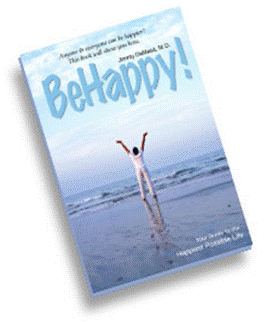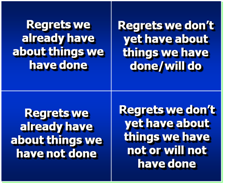

|
February 2012  Hi there... Hi there...If you’re one of the hundreds of new daily visitors to BeHappy101.com or a new subscriber to this BeHappy! Newsletter, welcome! I’m Jimmy, and my mission is to improve your life by making it a bit happier - or, better yet, a lot happier - everyday. I am a doctor, “rejuvenating” corporate executive, entrepreneur, author, and speaker. My wife (Jill), our five-year-old daughter (Joie), and our two-year-old daughter (Jae) live in Tampa Florida and Newport Beach California. Through this newsletter, my website, my books, E-Coaching, and other BeHappy! products, I am committed to improving the lives of as many people as possible. So, I would love to hear from you on how your life has changed by using the BeHappy! system, or how I can help improve your life more by making the system even better. Please go to BeHappy101.com to provide your happiness tips, comments, suggestions, stories, or thoughts and I’ll respond to you personally – as appropriate - as soon as possible. Here’s to your happiness and to having the kind of life you want to have! BeHappy! my friends 
INTRODUCTION (for new subscribers) The purpose of this newsletter is to provide a regular and consistent supplement to the action-oriented process found within my website - www.behappy101.com - and in my first book, simply called BeHappy! It is intended to make a powerful contribution to the amount of joy and fulfillment in your daily life by providing regular tools, reminders, and strategies to:
Since my goal is to help make people happier, however, it is best to get the book to use along with the website to achieve maximum benefit from the plan (yes, that’s partly a sales pitch — but it’s true).
HAPPINESS FACTS
The BeHappy! Newsletter In addition to the annual “holiday happiness” part of the previous edition of this newsletter in December, the main part was all about “relationships” – the first of the “3-R’s” and the 4th component of our year-long, 7-part program designed to provide a “simple formula” (see below) for increasing your happiness significantly (the first 3 components were Gratitude, your Definition of Happiness and Contribution). If you are a new subscriber, or if you just haven’t read all previous editions in this series, it would be best for you to go back and read the other 5 parts to get the most out of this process. You can read the introduction to this series (the February 2011 edition) by clicking here, the first step of the process (the May edition) by clicking here, the August edition by clicking here, the October edition by clicking here, and the December edition by clicking here. From the December Newsletter, we discussed the correlation between relationships and happiness – and how to connect the two. Were you proactive in nurturing your current relationships? Did you do something special for your spouse, “significant other”, boyfriend or girlfriend? Did you take the time to sit and talk with your parents (if they are still here with us), take your child to a movie (even if you don’t see eye-to-eye sometimes), have lunch with a friend (especially one who you’ve not connected with in a while), or help a co-worker with a difficult problem? If so, hopefully you can see the effect this “relationship-building” has on your happiness. Because if you’ve done any of these things, I know you feel better about life right now. It’s not possible to NOT feel better when your relationships are strong and fulfilling - and you truly connect with people, especially those you care about. Then, as described last time, by being happier (i.e., feeling better about life), you can then also improve your relationships significantly (the “Happiness Loop”). Relationships are the first of what I call the fundamental “3-R’s” of happiness, because regardless of who you are and what your personal Definition of Happiness is, relationships are a factor in your overall happiness. So, make sure to understand the relationship “Happiness Loop” to help create your happiest possible life (you can click here for a brief description). Now, on to the topic for this edition of The BeHappy! Newsletter... Are You As Happy As You Can Be? (Part 6) In this year-long (7-Part) series, which started last February and will go until the next edition in April, the objective is to help you be as happy as you can possibly be. And so, if the answer to the above question is “no” (you don't feel you're as happy as you could be) then you’re on the right track here to change the answer to “yes” and now it’s time to take the next step in the process. The Next Part of "The Happiness Formula" Once again, the “Happiness Formula” I've created is ... H = (G + DH + C + 3R) ÷ 6 ... where “H” stands for Happiness (described in the February edition of the newsletter), “G” stands for Gratitude (described in the May edition), “DH” represents your Definition of Happiness (described in the August edition) “C” refers to “Contribution” (described in the October edition) and “3R” stands for the fundamental “3-R’s” of happiness – Relationships, Rules, and Regrets, where the first "R" - Relationships - was addressed in the December edition. I was planning to address each of the 3-R’s, one at a time, in a separate newsletter, but I’ve decided to address both rules and regrets (the next 2 “R’s”) in this edition, saving the final edition in this year-long series for a recap, some conclusions, and some final actions to complete the process. The 2 remaining “R’s” are Rules and Regrets. These are both a bit complicated, but also tremendously important aspects of happiness ... and life. So, let’s get into the second of the 3 “R’s”, which is Rules... We all have certain “rules” which guide our actions and our lives. These rules have been developed throughout our lives as we grew up, and were established partly by the major influences and events of our lives. It can be a somewhat complex subject, but generally speaking, the more rules we have, and the stricter those rules are, the less happy we will be. Why? Because everyone has a different set rules (developed based on each person's specific upbringing, influencers, and experiences), and so if we have lots of rules, many of those rules will get “broken” on a consistent basis by other people’s rules (which are different than ours). So, if you have a lot of rules, and you associate with people who also have a lot of rules (that are different from yours), your rules will be “broken” or “violated” often – creating frequent conflict, frustration, and pain. As a simple example, if you have a rule about “saving money” and you live with a spouse whose rule leans more toward “spending money”, there will likely be frequent conflict, specifically about money. My former business partner, Tony Robbins (the well-known personal development and life coach) teaches that every disagreement, fight, war, act of terrorism, or other “upset” between people is due to a difference in their rules. I happen to believe that’s completely true. Think about it. What do you argue about with your spouse, your friends, or your family? Why are wars started? What instigates acts of terrorism? It’s all about differing rules (based sometimes on opinions between the two or more parties involved). Whether it’s about money, the kids, vacations, fidelity, politics, religion, or anything else – it comes down to a difference in our rules that causes the conflict Changing Your Rules… Changing our rules is not easy. Why? Because our rules are dear to us. Many times they are fundamental principles we have created for ourselves, or which were created for us by others, over many, many years – some since the time we were born – which can be very deep-seeded in our psychology. Even more difficult is changing other people's rules. In relationships, rules can cause significant arguments - even simple rules. For example, is one of your rules that you must always be on time for every appointment, event, gathering, party or function? And what is the rule on this topic of your spouse, significant other, family members, or closest friends? Is it the same or is it that if you’re within 30 minutes of the planned time it’s OK? Or do they not even have a rule related to punctuality? If it’s one of the latter two and your rule is to be punctual, then you will likely (a) feel stressed every time you’re late (which is probably often) and/or (b) have an argument with that person about it. Do you get the picture? Well, that’s a very minor “rules upset” (and it’s actually a frequent one for me in my family). My wife, for example, gets stressed because she knows my rule about punctuality and I get irritated because my punctuality rule is frequently violated (especially now that we have two young daughters, ages 5 and 2). To reduce or eliminate the “upset” associated with this simple example is a three-fold process:
After discussing the details surrounding his frustration and concerns, it was clear to me that – as always – it was a rules conflict that was creating most of the problem. So, my advice to him was “simply” that he had to change his rules a bit (this is one of those “simple” but not necessarily “easy” things in life). The bottom line to this example was that my friend took my advice, and to this day, has remembered that night because of its impact on his life (he has thanked me several times over the years for possibly “saving” his relationship with his son). His son is now 25 years old and he and my friend enjoy a wonderful relationship together. Sure, they have their disagreements – as we all do with people we love. And certainly, their rules are not perfectly aligned (since they rarely are). But just changing some very strict rules into guidelines can make a very big difference in people’s lives. I know my friend, and I'm sure he has coached his son on this as well – which has also helped a lot.We’ll take some actions to reduce the effects of rules on your life in a minute.  Now, though, let’s move on to the last of the 3-R’s… Now, though, let’s move on to the last of the 3-R’s…REGRETS: Regrets can influence happiness negatively – and major regrets can literally destroy our chances of being totally happy in life. As the chart on the right indicates, there are 4 general types of regrets we can have in our lives. And, within these 4 types of regrets, each one can have minor, moderate, or major variations. If you have a “minor” regret in the bottom left quadrant, for example, it may be something like you regret never having traveled to Europe (or if you live in Europe, maybe you regret never having traveled to Africa). The point is, this is a relatively minor regret which may be slightly negative for you, but it will likely not affect your life much. If, however, you are a woman in your 50’s and you regret never having children, for example, it could be a major regret and may have a significant, major impact on your happiness. Since this is one of the fundamental “3-R’s” of happiness, we must all be proactive in either reducing the effects of regrets we already have or reducing the chances of having major regrets in the future.
So, now it’s time to take action toward addressing these next two “3 R’s” – Rules and Regrets. BeHappy! ACTIONS TO TAKE UNTIL THE NEXT ISSUE OF THIS NEWSLETTER Like everything in life, the old saying, “practice makes perfect” applies to happiness, too. By using the tools and concepts in BeHappy! - and applying the principles on my website (www.behappy101.com) and in this bi-monthly newsletter - you'll get the coaching and the “practice” you need to lead the happiest possible life. It takes daily action to get “perfect” at it, though. So, if you have read previous editions of The BeHappy! Newsletter you know that every issue provides some simple action-oriented exercises for the next two months (until the next edition of the newsletter) which relate to the main "subject" of this edition of the newsletter to help make happiness a habit. Just a few minutes of focus every day and you’ll be laying the foundation for the happiest possible life - both for yourself and for those you love. If you do these things, I can promise you’ll notice a big difference in the quality of your life. You will BeHappy! Actions for the next 60 days: Take these actions over the next sixty days and by the time you receive the next edition of the BeHappy! Newsletter (around mid-April), you will have a sense of how you can increase happiness in your life significantly by reducing your “rules” and your “regrets”. Actions to Take: RULES: So, what are your rules? Do you have lots of them? Are they different from some of the rules of the people you spend time with? If you are frequently in arguments with these people, chances are you have too many rigid rules. So you must either eliminate some of them, or at least change as many of your rules as possible to guidelines. In my book, BeHappy!, there is a series of exercises designed to do just that and improve your life – and your relationships – dramatically.
We should all evaluate and challenge our rules. Are some of them not even appropriate anymore? Are some of them changeable? Can some be eliminated altogether? Then, once this is done, can you discuss this topic with the people you spend time with regularly (especially those people who you seem to fight with frequently)? If you can reduce, change, or eliminate some of your rules, and then get those people you relate to regularly to do the same thing, there is no question your life will improve significantly. So the action to take here is basically to:
REGRETS Since regrets can have a significant impact on our happiness, it is critical that we all take action toward eliminating the regrets we already have and prevent those we don’t yet have. For a quick and easy action to take, first, do a simple exercise I call “The Rocking Chair Test”.  Basically, this means imagining yourself near the end of your life (maybe you’re in your 80’s or 90’s) and look back over what you’ve done and haven’t done in your life. Are you “happy” with everything? Are there things you might wish you had done (like travel more, learn how to play a musical instrument, learn a different language, take care of underprivileged kids, or fostered a better relationship with your own kids)? Are there any significant things you might regret having done (like spending the past 30 years in a bad relationship or working 80 hours per week in a job you didn’t really love and missing important time with your family)? Once you take this little “test”, write down what came to your mind while you are sitting there in your rocking chair. Then, do something about it. If, for example, you regret never having learned to play a musical instrument – make it a goal for this year to start. Or maybe you might regret someday that you smoked all your life (as a doctor, I have seen a lot of cases of this regret). So, make it a commitment to quit now. There are countless examples and just as many “remedies” for how we can eliminate the effects of regrets on our lives. It just takes thought and a plan. Take these actions over the next 60 days to reduce your rules and regrets. Go to BeHappy101.com for more advice on how to do this. Or, get a copy of BeHappy!, which goes through this process in great detail, including some exercises to change your rules and deal with regrets (both those you already have and those you don't yet have). As always, we’ll look back on this 60-day action plan in the next edition of The BeHappy! Newsletter around the middle of April - where we'll then take the next step toward making profound improvements to your happiness – and your life - by summarizing our year-long exploration into "The Happiness Formula”. WHAT'S NEW AT BeHappy101.com: Every issue of this newsletter will keep you up to date on new stuff at BeHappy101.com so you can get maximum benefit from the BeHappy! system. You can access any of these quickly by just clicking on the links in the list below. Here's what's new at BeHappy101.com:
So until the next edition of The BeHappy! Newsletter around the middle of April... Thanks for being a loyal subscriber and... BeHappy! my friends
|
 ORDER BeHappy! NOW by... clicking here DISCOUNT now at Amazon.com. |
To go to behappy101.com click here now


 MY GUARANTEE TO YOU: While most of the information at behappy101.com is free, I want you to BeHappy! with anything you purchase on this site; our reputation depends on it. Nothing is more important to me personally than for you to be completely satisfied with the information you receive. So if you are not satisfied with anything you buy on this site, for any reason whatsoever, simply
MY GUARANTEE TO YOU: While most of the information at behappy101.com is free, I want you to BeHappy! with anything you purchase on this site; our reputation depends on it. Nothing is more important to me personally than for you to be completely satisfied with the information you receive. So if you are not satisfied with anything you buy on this site, for any reason whatsoever, simply 